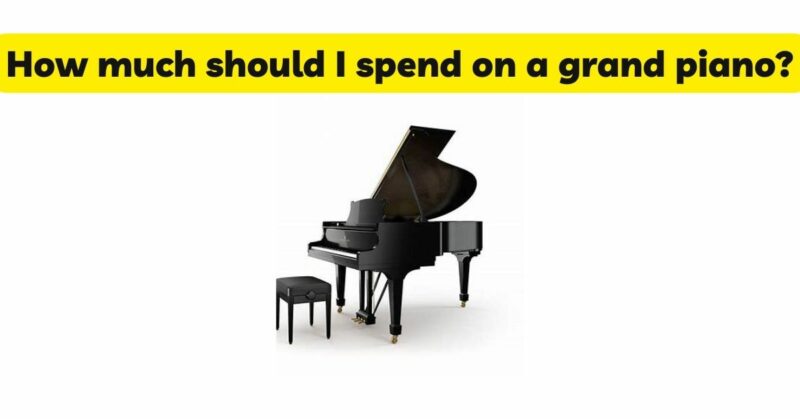Acquiring a grand piano is a significant decision that requires careful consideration of several factors, with one of the most critical being the budget. Determining how much to spend on a grand piano is a complex task, as it depends on various elements, including brand reputation, size, craftsmanship, materials, condition, and personal preferences. In this article, we will explore these aspects to help you make an informed decision and determine the ideal budget for your grand piano purchase, taking into account your musical aspirations, financial capabilities, and the value you seek from this remarkable instrument.
- Evaluating Brand Reputation: Brand reputation plays a pivotal role in the pricing of grand pianos. Esteemed brands such as Steinway & Sons, Bösendorfer, and Yamaha have earned global recognition for their exceptional craftsmanship, tonal quality, and longevity. Consequently, pianos from these renowned brands often come with a higher price tag. However, it is worth noting that there are also reputable mid-range and boutique brands that offer excellent instruments at more affordable prices, allowing pianists to find a balance between quality and cost.
- Considerations of Size and Model: The size and model of a grand piano significantly influence its cost. Grand pianos come in various sizes, ranging from baby grands to concert grands. Generally, larger grand pianos have higher price points due to their larger soundboards, longer strings, and enhanced tonal richness. Concert grands, being the largest and most prestigious, tend to be the most expensive. However, it is essential to strike a balance between the desired sound quality, available space, and budget limitations to find a size that best suits your needs.
- Craftsmanship and Materials: Craftsmanship and materials used in the construction of a grand piano impact both its quality and price. Fine grand pianos are the result of meticulous craftsmanship by skilled artisans who pay attention to every detail, resulting in superior sound quality and durability. The use of premium materials, such as high-quality woods for the piano case, soundboard, and strings, contribute to the instrument’s tonal excellence. Consequently, grand pianos crafted with exceptional skill and high-end materials tend to command higher prices.
- Balancing New and Used Instruments: Determining whether to purchase a new or used grand piano is an important consideration when setting your budget. New grand pianos offer the advantage of pristine condition, manufacturer warranties, and the latest technological advancements. Their prices can vary widely, ranging from several thousand dollars for entry-level models to several hundred thousand dollars for top-tier brands and concert grands. On the other hand, used grand pianos, if well-maintained, can offer excellent value for money and provide access to high-quality instruments at lower price points.
- Condition and Maintenance: The condition of a grand piano influences its price, regardless of whether it is new or used. A well-maintained instrument with regular servicing and proper care tends to command a higher price. However, it is important to assess the condition of the piano thoroughly, considering factors such as wear and tear, age, any necessary repairs, and the availability of maintenance records. Budgeting for potential restoration or maintenance costs can ensure that you invest in a grand piano that will provide long-term satisfaction.
- Personal Preferences and Value Proposition: Personal preferences and the value proposition of a grand piano should also guide your budgetary considerations. Consider the specific features and characteristics you are seeking in an instrument. This may include factors such as the aesthetic design, historical significance, tonal quality, and playability. Evaluating the value that the grand piano will bring to your musical journey and the level of satisfaction you anticipate will help you determine the budget range that aligns with your priorities.
Conclusion: Determining how much to spend on a grand piano requires careful evaluation of various factors, including brand reputation, size, craftsmanship, materials, condition, and personal preferences. Setting a realistic budget allows you to make an informed decision based on your musical aspirations and financial capabilities. While prestigious brands and larger instruments often come with higher price tags, it is crucial to find a balance between quality, affordability, and the value you seek from the instrument. Thorough research, consultation with experts, and the consideration of both new and used options will help you determine the ideal budget for your grand piano purchase. Ultimately, the budget you set should reflect your commitment to music, align with your goals and expectations, and provide a foundation for years of melodic inspiration and artistic growth.


